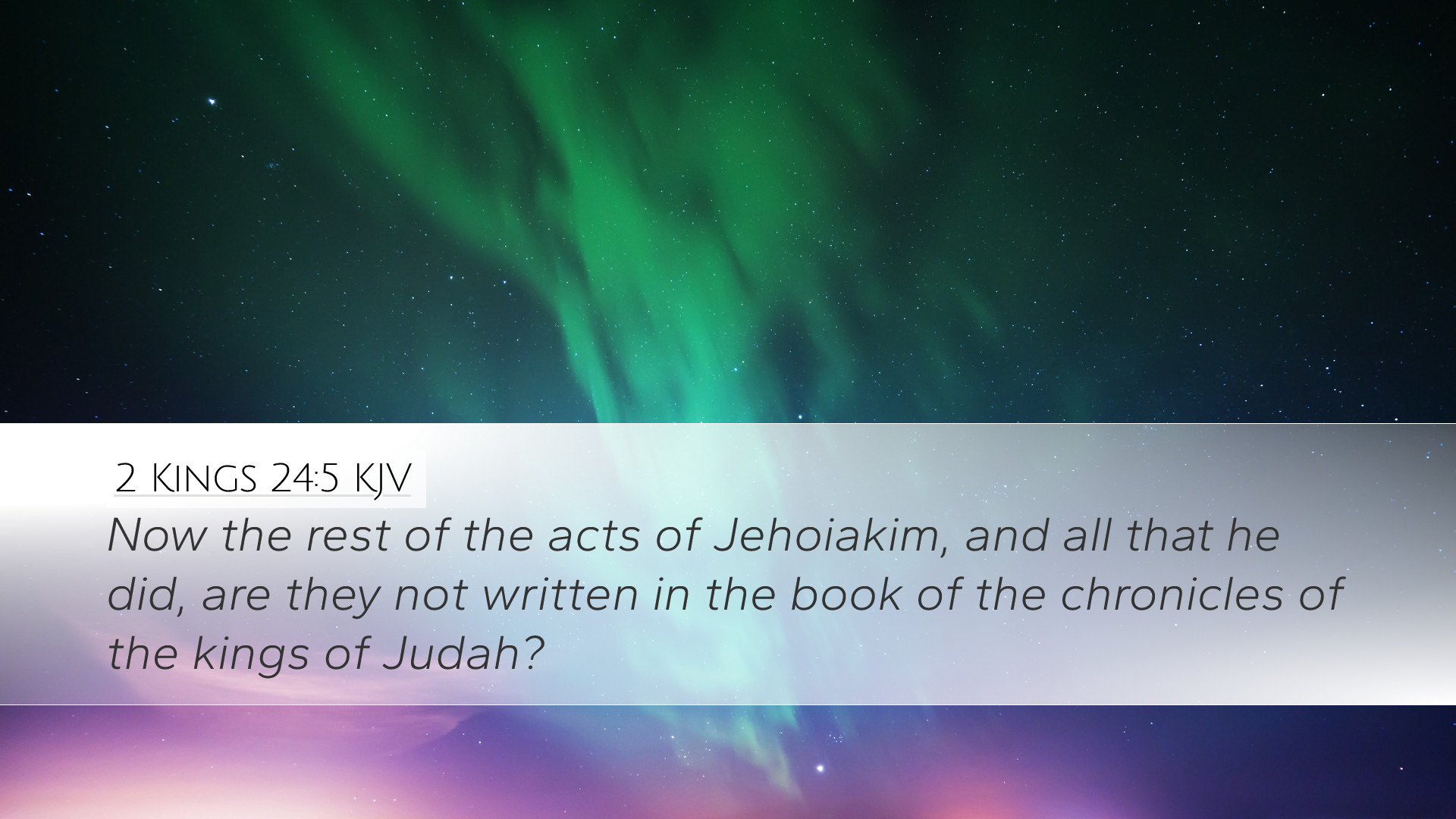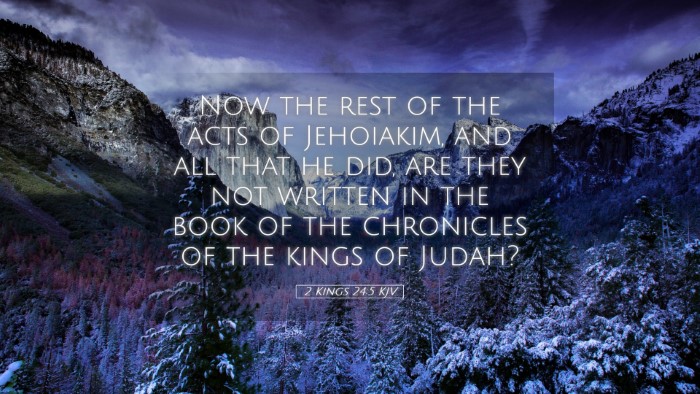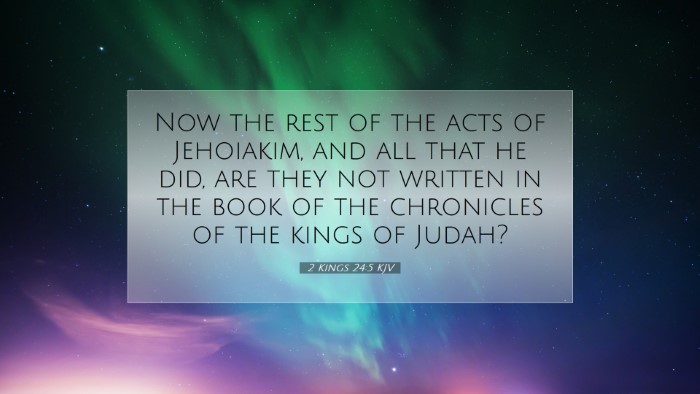Old Testament
Genesis Exodus Leviticus Numbers Deuteronomy Joshua Judges Ruth 1 Samuel 2 Samuel 1 Kings 2 Kings 1 Chronicles 2 Chronicles Ezra Nehemiah Esther Job Psalms Proverbs Ecclesiastes Song of Solomon Isaiah Jeremiah Lamentations Ezekiel Daniel Hosea Joel Amos Obadiah Jonah Micah Nahum Habakkuk Zephaniah Haggai Zechariah Malachi2 Kings 24:5
2 Kings 24:5 KJV
Now the rest of the acts of Jehoiakim, and all that he did, are they not written in the book of the chronicles of the kings of Judah?
2 Kings 24:5 Bible Commentary
Commentary on 2 Kings 24:5
Verse Reference: 2 Kings 24:5 - "Now the rest of the acts of Jehoiakim, and all that he did, are they not written in the book of the chronicles of the kings of Judah?"
Introduction
This verse serves as a concise historical summary concerning the reign of King Jehoiakim of Judah. It emphasizes the importance of historical accounts as they relate to the larger narrative of the Israelite monarchy and the unfolding of God's plan through the history of His people. While it may appear as a mere historical footnote, it encapsulates significant theological implications and lessons for contemporary readers.
The Historical Context
Jehoiakim, son of Josiah, reigned in a turbulent time, characterized by political upheaval and moral decay. The backdrop to his reign included the declining power of Judah, the rise of Nebuchadnezzar king of Babylon, and the imminent threat of exile that would soon befall the Jewish people. Understanding this context is crucial for interpreting the significance of Jehoiakim’s actions and the divine judgment that followed.
Insights from Commentators
-
Matthew Henry:
Henry emphasizes that this verse provides an important reminder of the fleeting nature of human authority and the eventual accountability that all leaders, including Jehoiakim, will face. His reign was marked by rebellion against God, and Henry notes how this reflects the larger narrative of the kings of Judah who often led the people astray.
-
Albert Barnes:
Barnes points out that this verse indicates a source for further information regarding Jehoiakim's reign. The reference to "the chronicles of the kings of Judah" suggests that a fuller account exists, embodying the theological impulses to preserve the history of God's people and their kings in light of divine providence.
-
Adam Clarke:
Clarke discusses the notion of accountability in leadership. Jehoiakim's reign, while significant, was not free from the aspects of judgment that would come upon him due to his idolatry and wickedness. He remarks on the records that document the moral and spiritual failings of kings, situating this within the broader redemptive history of Israel.
Theological Implications
The brevity of this verse speaks volumes about the transience of human achievement in contrast to the enduring legacy of God’s covenant. It provokes reflection on how history is recorded and remembered in the sight of God, challenging contemporary leaders to consider their legacy not just in political terms but in fidelity to divine mandates.
Accountability and Legacy
As with Jehoiakim, modern leaders are called to live in a way that honors God's commandments. The acknowledgment that the acts of kings are chronicled serves as a theological reminder that every action is significant in God’s eyes. This echoes through Scripture, urging leaders today to reflect on their paths and choices.
The Importance of Historical Records
God's sovereignty over history is a recurrent theme within the Scriptures. The mention of the "book of the chronicles" not only indicates the preservation of history but also signifies that God is the ultimate historian who ensures that the moral aspects of actions are recorded for future generations. This draws attention to how history serves a purpose beyond mere facts, for it encapsulates moral narratives that point toward God's justice and grace.
Application for Today
For pastors, theologians, and students of the Bible, 2 Kings 24:5 is a call to vigorous historical awareness in interpreting biblical accounts. Understanding the contextual and theological layers tied to this verse enables a richer comprehension of Scripture and the faithfulness of God amidst human unfaithfulness.
Reflection Questions
- What can be learned from Jehoiakim’s leadership that applies to future generations?
- How do the chronicles of past leaders influence our understanding of God's character and actions today?
- In what ways can the commentary on this verse inform our approach to modern political and spiritual leadership?
Conclusion
This commentary on 2 Kings 24:5 serves as a reminder of the importance of history within God's redemptive narrative. It highlights the significance of accountability, the moral recording of leadership, and the ongoing relevance of Scripture for contemporary believers. In all things, we are called to be mindful of our actions, recognizing that they contribute to the grand narrative of God’s kingdom.


